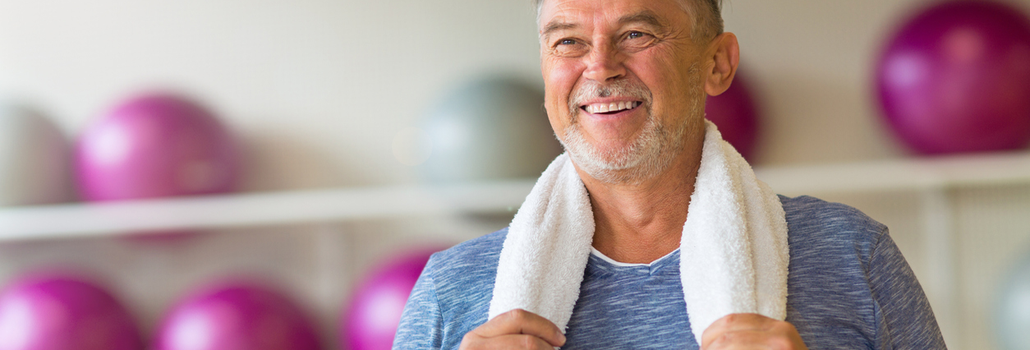
Why losing weight gets harder with age
You’re doing the same you’ve always done – trying to eat well and exercise regularly – but the kilos are creeping on and the battle to keep a waistline is getting harder and harder. Accredited Practising Dietitian Trish Guy is here to provide insight into why this might be and how you can manage it.
So, does it actually get tougher to stay in shape as you get older?
As we reach our 30’s, our bodies usually need less energy, meaning we may not be able to eat the way we did in our 20’s.
Then, as you move past 40 and head to middle age, changes in muscle, hormones and metabolism all make it harder to stay trim. But it’s not a lost cause. By understanding how your body changes, you can work to manage your weight more effectively.
MUSCLE LOSS
Men don’t miss out on the hormone rollercoaster either. Typically from the age of 40, testosterone levels drop. As testosterone is responsible for regulating fat distribution, muscle strength and muscle mass, less testosterone can make it harder to burn calories.
Both men and women produce less growth hormone from middle age, another hormone involved in regulating body fat.
So, with all these changes to your body working against you, how can you combat weight gain as you age?
1. Make each mouthful count – Focus on nutrient-dense foods full of vitamins and minerals, fibre and protein, like fruit, veggies, legumes, nuts and whole grains.
2. Watch portion sizes – If you don’t burn all the energy from the foods and drinks you consume, your body will store it as fat. As you get older it’s important to watch your portion sizes and potentially cut back how much you eat to suit what your body now needs.
3. Mix up your exercise – It’s important to get a mix of aerobic exercise and weight training. Aerobic exercises that get your heart rate up, like running and cycling, burn more calories. Weight training helps by building up and strengthening muscle.
4. Stay hydrated – Drink plenty of water and steer clear of fizzy drinks. Mild dehydration can cause symptoms similar to hunger, so try having a glass of water before automatically grabbing a snack. Dehydration has also been linked to increased risk of obesity and a higher BMI.
5. Stress less and sleep well – Find activities to help you stress less. You’ll be less likely to reach for comfort foods, you’ll sleep better and be more inclined to stick to exercise goals.
6. Health is more than one number – It can be tempting to get fixated on your weight, but health is much more than just a number on the scales. Focussing on eating a healthy diet, doing regular physical activity, sleeping well and looking after your mental health are all really important for your overall wellbeing, and can have the added benefit of helping to maintain a healthy weight.
For more information about healthy eating, chat with your local Dietitian or a healthcare professional, who will be able to provide individualised information for you.
So, does it actually get tougher to stay in shape as you get older?
As we reach our 30’s, our bodies usually need less energy, meaning we may not be able to eat the way we did in our 20’s.
Then, as you move past 40 and head to middle age, changes in muscle, hormones and metabolism all make it harder to stay trim. But it’s not a lost cause. By understanding how your body changes, you can work to manage your weight more effectively.
Why is it harder to lose weight as you get older?
MUSCLE LOSS
- As you get older you lose muscle. This has a bigger impact than simply losing muscle definition and tone. Muscle actually burns more calories than fat, so having less muscle means it’s harder to use the calories you’re eating.
- So why do you lose muscle? While hormones can play a role, the old adage “if you don’t move it you lose it” rings true. Whether it’s a busy family life or out of control work hours, finding time to work out gets tougher and we tend to move less. This can be compounded by injuries, which unfortunately become more common. So more than ever, as you get older you need to stay active to keep muscles strong.
- Increased stress can contribute to weight gain. Time pressures can relegate exercise to last on the list, and when you’re under the pump, it’s easy to ditch the diet and reach for a quick snack or sugar fix. Stress also increases your level of the hormone ghrelin, which makes you hungry and increases fat storage.
- Your metabolism runs 24/7 turning the food and drink you eat into energy for your body to function. Even when you’re sleeping, it’s providing your body with the energy needed to circulate blood, breathe and repair cells. Your metabolism can slow down with age, which means you burn fewer calories and store more fat.
- Hormonal changes can tip the scales too. For women, it’s very common to gain weight during menopause with a drop in oestrogen triggering an increase in weight, especially around the belly. Even in your mid-40s, the lead up to menopause can cause mood fluctuations that make it more difficult to stick to a regular healthy eating and exercise regime.
Men don’t miss out on the hormone rollercoaster either. Typically from the age of 40, testosterone levels drop. As testosterone is responsible for regulating fat distribution, muscle strength and muscle mass, less testosterone can make it harder to burn calories.
Both men and women produce less growth hormone from middle age, another hormone involved in regulating body fat.
So, with all these changes to your body working against you, how can you combat weight gain as you age?
Trish's 5 tips on preventing weight gain
1. Make each mouthful count – Focus on nutrient-dense foods full of vitamins and minerals, fibre and protein, like fruit, veggies, legumes, nuts and whole grains. 2. Watch portion sizes – If you don’t burn all the energy from the foods and drinks you consume, your body will store it as fat. As you get older it’s important to watch your portion sizes and potentially cut back how much you eat to suit what your body now needs.
3. Mix up your exercise – It’s important to get a mix of aerobic exercise and weight training. Aerobic exercises that get your heart rate up, like running and cycling, burn more calories. Weight training helps by building up and strengthening muscle.
4. Stay hydrated – Drink plenty of water and steer clear of fizzy drinks. Mild dehydration can cause symptoms similar to hunger, so try having a glass of water before automatically grabbing a snack. Dehydration has also been linked to increased risk of obesity and a higher BMI.
5. Stress less and sleep well – Find activities to help you stress less. You’ll be less likely to reach for comfort foods, you’ll sleep better and be more inclined to stick to exercise goals.
6. Health is more than one number – It can be tempting to get fixated on your weight, but health is much more than just a number on the scales. Focussing on eating a healthy diet, doing regular physical activity, sleeping well and looking after your mental health are all really important for your overall wellbeing, and can have the added benefit of helping to maintain a healthy weight.
For more information about healthy eating, chat with your local Dietitian or a healthcare professional, who will be able to provide individualised information for you.

The latest nutrition advice, plus health and wellness tips delivered to your inbox monthly

